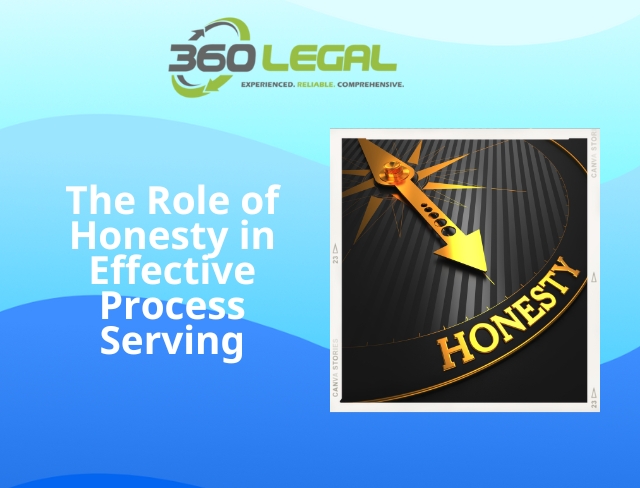Testing RSS Feeds.. ignore post.
Testing RSS Feeds.. ignore post.
The Role of Honesty in Effective Process Serving

Process serving is an important part of the legal system. To initiate a lawsuit or ensure someone’s rights are protected, critical legal documents must be properly delivered or “served.” This requires process servers to uphold high ethical standards, especially honesty.
What is Process Serving?
Process serving is formally delivering legal documents like subpoenas, summons, complaints, motions, and court orders to the required recipients. Rules for who can be served and how service must happen vary by jurisdiction.
Effective process serving means:
- Finding the right individual to be served
- Personally delivering documents to them
- Providing proof that service was completed properly
When process servers adhere to regulations and provide valid service, legal cases can move forward. If process is flawed, cases stall or documents may need to be re-served.
Why Honesty is Crucial
Honesty and ethical conduct are essential for process servers. As officers of the court, they have legal obligations.
Dishonest actions like:
- Falsifying service documents
- Serving the wrong people
- Lying about inability to locate defendants
Could constitute fraud and lead to invalid service, lawsuits, and other consequences for the server and plaintiff.
Upholding the Law
Process servers must strictly follow rules about who can accept service and what methods are allowed in each jurisdiction. Ethical servers understand the laws and obligations associated with their role in the legal process.
Avoiding Conflicts of Interest
The following is a DRAMATIZATION AND IS NOT AN ACTUAL EVENT: For example, Bob’s Bail Bonds hires process server Jane to serve court documents on John, who skipped his court date. But Jane and John are close friends. Serving the documents could jeopardize their relationship. An honest process server would disclose this conflict of interest to the company before accepting the assignment.
Being Transparent About Challenges
Even with diligent efforts, some defendants are difficult to locate. Ethical process servers are upfront about challenges trying to serve elusive parties. They don’t exaggerate service attempts to inflate costs.
Honest communication helps set expectations with plaintiffs and courts when perfect service just isn’t feasible. It may reveal additional steps like hiring investigators or staking out locations.
Maintaining Accurate Documentation
Honest process servers understand the importance of meticulous record-keeping and documentation. They know courts rely on the proof of service affidavit to verify proper service was completed.
Ethical servers accurately document details like:
- The name of defendant served
- Date, time, and location of service
- Description of documents served
- Any unique details about the service
They fill out the proof of service truthfully, double check all information, and correct any errors before submitting. Accurate documentation avoids creating discrepancies that could invalidate the service.
Avoiding Careless Mistakes
The following is a DRAMATIZATION AND IS NOT AN ACTUAL EVENT: A process server for ABC Legal was rushing while filling out proof of service forms and put the wrong date. The actual service happened 2 days later than noted. This kind of careless mistake could make the service flawed if challenged in court.
Being meticulous ensures proof documents align with what actually happened during service. Attentiveness to details demonstrates a process server’s honesty and reliability.
Example of Communication
The following is a DRAMATIZATION AND IS NOT AN ACTUAL EVENT: Tyler’s company hired process server Patty to serve notice of a lawsuit on a contractor who never finished work on their building. After visits to multiple addresses and work sites, Patty reports back that the contractor appears to have moved out of state temporarily. This transparency allows Tyler to make informed decisions about next steps.
Building Trust with All Parties
A process server’s reputation for integrity helps attract business, win court appointments, and foster good relationships. Parties are more likely to amicably accept service from a company known for honesty versus one with a sketchy track record. Ethical servers focus on completing service properly, not cutting corners.
Avoiding Shortcuts
The following is a DRAMATIZATION AND IS NOT AN ACTUAL EVENT: Steve was served divorce papers by a process server while he was out of town. The server falsely claimed Steve was “served” at his house. In reality, they just threw the papers on his driveway. This dishonest shortcut could invalidate the service and cause problems in the divorce case.
Choosing an Ethical Process Server
When you need help serving important legal documents, it pays to choose an honest, professional process serving company you can trust completely.
Look for:
- Licensing and good standing in your state
- Proof of insurance
- Company longevity and reputation
- Transparent communication and practices
At 360 Legal integrity is our foundation. Our veteran team of legally compliant process servers upholds strict ethical standards on every assignment. Contact us 24/7 for help with your service of process needs.
FAQs
1. What should I do if I suspect a process server is being dishonest?
If you believe a process server is engaging in dishonest practices, report them to your state licensing board and the attorney or party that hired them.
2. How can I confirm a process server is licensed?
You can verify a process server’s license status by contacting your state’s licensing board. Many boards also provide license lookup tools on their websites.
3. What happens if a process server lies about service?
If a process server falsifies service documents, the service may be invalidated. The server could face criminal charges for fraud and lose their license.
Trust the Process Serving Experts
When you hire 360 Legal you get transparent, ethical service you can rely on fully. To learn more or get a quote, call us at (888) 360-5345 or contact us online today.
Author
We are Social!
Latest tweets
Popular Tags
Testimonials
"5 star service ! prompt serving, helpful, professional . "
"Mike is awesome. Our firm has hired him on several occasions and we are very happy with his work. His prompt serving, helpful, professional and always in communication. I recommend him highly! "
"360Legal provides speedy and easy to use Process Service that is flexible, and very transparent with nearly instant reporting. It is very helpful for us to be able to track the status of our process service jobs, especially when they are time sensitive. "
Latest News
-

RMAI 2021 Annual Conference RMAI Annual Conference
April 12-15, 2021 -

NATIONAL CREDITORS BAR ASSOCIATION 2020 SPRING CONFERENCE
May 19-21, 2021 -

ALFN ANSWERS 2021
Jul 18-21, 2021 -

Annual Convention and Expo
Oct. 17-21, 2021 -

Florida Association of Professional Process Servers 33rd Quarter Board Meeting/Professional Beach Getaway
Aug. 20-22, 2021












